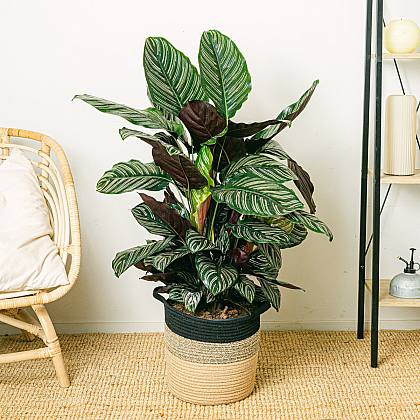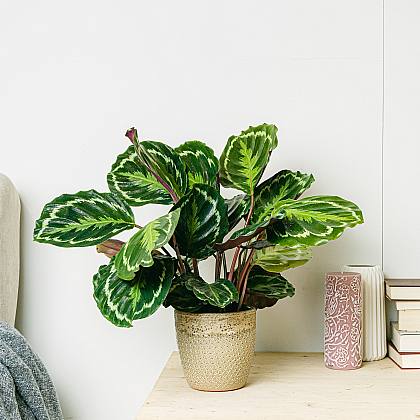Calathea and Pets: A safe choice for animal lovers
In addition to being a feast for the eyes, the Calathea plant is a safe choice for animal lovers. In this article, we'll look at why the Calathea is an ideal...
In addition to being a feast for the eyes, the Calathea plant is a safe choice for animal lovers. In this article, we'll look at why the Calathea is an ideal houseplant for pet owners. We will also discuss the dangers of poisonous plants for pets and show why the Calathea is a non-toxic alternative to other houseplants. Furthermore, we give tips on how to care for and keep Calathea with pets in the house and present the best Calathea varieties for pet owners. You'll also learn how to protect the delicate Calathea leaves from curious pets.
The Calathea plant: beauty and safety in one
The Calathea plant is a wonderful combination of beauty and safety for pet owners. This houseplant is not only aesthetically pleasing, but also non-toxic to our beloved four-legged friends. This makes them a safe choice for animal lovers who want to protect their pets from the dangers of poisonous plants. Unlike some other popular houseplants, the Calathea does not contain any toxic substances that could harm our pets. This allows us to sit back and relax and enjoy the beauty of this plant in our home without worrying about possible poisoning. However, the Calathea does not only offer security, but also a wide variety of varieties from which we can choose. From Calathea ornata with its striking pink stripes to Calathea lancifolia with its impressive lanceolate leaves, there is something for everyone. To make sure that our curious pets don't attract too much attention, we can also follow some simple tips to protect the Calathea leaves from them. By placing the plant in an elevated spot or shielding it with a trellis, we can prevent our furry friends from nibbling on or playing with the leaves. With all these benefits, it's no wonder that the Calathea plant is a popular choice for pet owners looking for both security and beauty in their home.
Why is the Calathea an ideal houseplant for pet owners?
The Calathea is an ideal houseplant for pet owners for several reasons. First, it is not toxic to pets such as dogs and cats. Many popular houseplants can contain dangerous toxins that can lead to gastrointestinal problems or even poisoning in pets. With the Calathea, animal lovers can have peace of mind as it offers a non-toxic alternative to these plants.
Second, the Calathea has a sturdy structure that deters curious pets from nibbling on or damaging the leaves. The large, wide leaves of the Calathea are not only beautiful to look at, but also resistant enough to withstand the playful attacks of pets. This makes them a safe choice for pet owners who want to protect their plants from accidental damage.
In addition, the Calathea is also relatively easy to care for and adaptable. It doesn't require intensive care and can thrive in a variety of lighting conditions, including indirect light and partial shade. This makes them ideal for pet owners who may not have a lot of time to take care of their plants.
Overall, the Calathea is a wonderful option for pet owners looking for a beautiful houseplant that is safe and easy to care for. With its non-toxic nature and sturdy structure, it offers a great way to make the home green without worrying about potential dangers for pets.
Poisonous Plants and Their Dangers to Pets
Poisonous plants can pose a serious danger to pets such as dogs and cats. Many houseplants that are popular with humans can cause poisoning in pets. Some of the most common poisonous plants are Dieffenbachia, Philodendron, and Ivy. These plants contain toxins that can cause symptoms such as vomiting, diarrhea, and skin irritation in pets. In severe cases, poisoning can even be fatal. It's important for pet owners to educate themselves about the potential dangers and make sure they only have non-toxic plants in the house. If you have a poisonous plant and a pet lives in your home, you should keep the plant in a place where your pet can't reach. Another option is to replace the plant with a non-toxic alternative. Calathea is a great choice for animal lovers as it is non-toxic and also makes a nice addition to any room. However, if your pet still nibbles on the leaves, you should make sure that they don't get any health problems. Keep the Calathea plant away from curious pets and make sure it gets enough water and light. By making sure your pets can't eat or touch poisonous plants, you can ensure their well-being while beautifying your home.
Calathea: A non-toxic alternative to other houseplants
Calathea is a houseplant that is very popular among animal lovers because it is non-toxic to pets such as dogs and cats. Unlike many other houseplants that grow in our homes, Calathea does not contain any toxic substances that can be dangerous to our furry friends. However, it is important to note that although Calathea is not poisonous, it is still possible for pets to chew on or damage the leaves. If this is the case, it can cause an upset stomach or vomiting. To avoid this, pet owners should keep their Calathea plants in a safe place and make sure their pets are not around when watering or caring for the plants.
Calathea is a great alternative to other houseplants that can be dangerous for pets. There are many varieties of Calathea to choose from and they are all relatively easy to care for. They only need moderate light and regular watering to stay healthy. Another advantage of Calathea is that they are not only non-toxic to pets, but they are also a decorative addition to any home. The leaves often have beautiful patterns and colors that are pleasing to the eye and can enhance any room.
Overall, Calathea is a safe and attractive choice for animal lovers who want to brighten up their home with houseplants. With a few simple care tips and proper placement around the house, this plant can provide years of enjoyment while protecting our pets.
Tips for caring for and keeping Calathea with pets in the house
The Calathea plant is a safe choice for pet owners because it is non-toxic and not harmful to animals. But how do you properly care for this plant if you have pets in the house? Here are some tips for caring for and keeping Calathea with pets in the house:
1. Location: The Calathea prefers a bright location, but direct sunlight should be avoided. It is also important to protect the plant from drafts.
2. Watering: The Calathea needs regular watering, but it is important to avoid waterlogging. The soil should be kept slightly moist, but not too wet.
3. Humidity: The Calathea needs high humidity to stay healthy. It is advisable to spray the plant regularly or place it near a humidifier.
4. Fertilization: The Calathea should be fertilized every two weeks during the growing season. It is best to use an organic fertilizer.
5. Pests: Watch out for pests such as spider mites and aphids. In case of an infestation, you should act quickly and treat the plant with a suitable insecticide.
By following these simple tips, one can ensure that the Calathea stays healthy while being a safe choice for pet owners.
The Best Calathea Strains for Pet Owners
When it comes to choosing the best Calathea strains for pet owners, there are a few varieties that work particularly well. Calathea orbifolia is a popular choice because its large, round leaves are a real eye-catcher and at the same time it is non-toxic to pets. Another recommended variety is Calathea medallion, which is an attractive addition to any room with its distinctive patterns on the leaves. For those looking for a slightly smaller option, the Calathea rattlesnake is a great choice. Their long, narrow leaves with an eye-catching pattern actually resemble a rattlesnake, adding a touch of exoticism to any room. Another variety that has been shown to be safe for pets is Calathea lancifolia, or also known as "arrowleaf". Its narrow leaves with the eye-catching green stripes are not only beautiful to look at, but also non-toxic to cats and dogs. When choosing a Calathea strain for your home, it's important to note that some varieties may have specific care requirements. Make sure you understand the needs of each strain and can meet them accordingly to ensure the well-being of your plant and pet.
How to Protect Calathea Leaves from Curious Pets
If you have pets and want to keep Calathea plants in your home, you need to make sure that your animals don't nibble on or damage the leaves. Although Calathea plants are non-toxic, curious pets can damage the leaves and spoil the appearance of the plant. Here are some tips to protect your Calathea leaves from pets:
1. Place your plants in a place where your pets can't easily access them.
2. If you keep your plants on shelves, make sure they are stable and can't tip over.
3. Cover the soil around your plants with pebbles or a layer of fine gravel to prevent your pets from reaching the leaves.
4. Spray your Calathea plants regularly with water to keep them clean and remove dirt and dust from the leaves.
If your pets are still trying to reach the leaves, you can use a natural deterrent such as lemon zest or vinegar.
By following these simple steps, you can ensure that your Calathea plants and pets can live happily and healthily together.
The Calathea plant is not only an eye-catcher in any room, but also a safe choice for animal lovers. Its non-toxic properties make it an ideal houseplant for pet owners who want to protect their beloved four-legged friends. Unlike many other plants that can be toxic to pets, Calathea offers a safe alternative. With a few simple care and keeping tips, you can enjoy this beautiful plant in your home without worry.
However, we should also be aware that not all plants are as safe as the Calathea. It's important that we educate ourselves about the potential dangers of poisonous plants to our pets and design our homes accordingly. Perhaps we should ask ourselves why so many plants are poisonous to animals and how we can protect our animal friends from such dangers. Because at the end of the day, it's all about creating a harmonious environment where both we and our pets can live happily and healthily.
In a world full of curiosity and discovery, we should always strive to make our environment safe and stimulating for us and our pets. The Calathea plant is an example of how we can combine beauty and safety. Let's continue to look for ways to combine our love of animals with our green thumbs and create a world where plants and pets can coexist harmoniously


